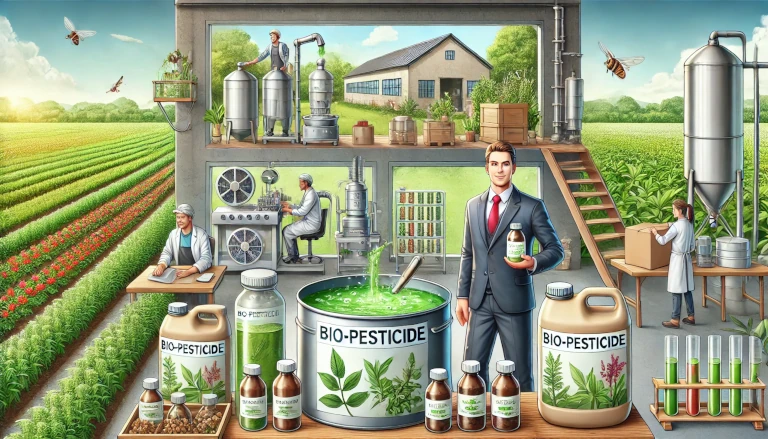Bio-pesticide production is a growing business opportunity in India, fueled by the demand for eco-friendly and sustainable agricultural practices. Bio-pesticides are natural pest control agents derived from microorganisms, plants, and minerals. They are safer for the environment, reduce chemical dependency, and improve soil health. With the government’s push for organic farming and sustainable agriculture, bio-pesticide production is a lucrative venture for entrepreneurs and agricultural businesses.
This guide provides a comprehensive overview of starting a bio-pesticide production business in India, covering key aspects such as setup, financial requirements, challenges, and marketing strategies.
What is Bio-Pesticide Production?
Bio-pesticides are eco-friendly alternatives to chemical pesticides, used to manage pests and diseases in crops. They are categorized into:
- Microbial Pesticides: Made from microorganisms like bacteria, fungi, and viruses. For example, Bacillus thuringiensis (Bt) is effective against caterpillars.
- Plant-Based Pesticides: Extracted from plants like neem, garlic, and chrysanthemum.
- Biochemical Pesticides: Naturally occurring substances like pheromones that disrupt pest behavior.
Bio-pesticide production involves cultivating, formulating, and packaging these products for agricultural use.
Why Start Bio-Pesticide Production in India?
There are several reasons to consider starting a bio-pesticide production business:
- Rising Demand: With the growth of organic farming, bio-pesticides are becoming increasingly popular.
- Government Support: Policies like the Paramparagat Krishi Vikas Yojana (PKVY) promote the use of bio-pesticides.
- Eco-Friendly Solution: Bio-pesticides are safer for humans, beneficial insects, and the environment.
- High Profit Margins: Farmers are willing to pay a premium for sustainable pest control solutions.
Getting Started with Bio-Pesticide Production 🛠️
Here’s a step-by-step guide to help you set up your bio-pesticide production business in India:
- Choose Your Product Line:
- Decide whether to produce microbial pesticides, plant-based pesticides, or both.
- Start with popular options like neem-based pesticides or microbial agents like Trichoderma.
- Select a Location:
- Choose a site with easy access to raw materials and farming communities.
- Ensure adequate space for production units, storage, and packaging facilities.
- Procure Raw Materials:
- Collect raw materials like neem seeds, microbial cultures, and solvents.
- Establish relationships with suppliers for consistent quality.
- Set Up Production Facilities:
- Invest in equipment like fermenters, mixers, dryers, and packaging machines.
- Maintain hygienic conditions to ensure product safety and quality.
- Obtain Regulatory Approvals:
- Register your products with the Central Insecticides Board (CIB) and the Ministry of Agriculture.
- Comply with labeling and safety standards.
- Develop a Skilled Team:
- Hire qualified professionals for production, quality control, and marketing.
- Train staff in handling and formulating bio-pesticides.
Challenges in Bio-Pesticide Production ⚠️
While promising, bio-pesticide production has its challenges:
- Regulatory Compliance: Meeting stringent registration and labeling requirements can be time-consuming.
- Raw Material Quality: Ensuring consistent quality of natural ingredients like neem seeds is critical.
- Market Awareness: Educating farmers about the benefits of bio-pesticides compared to chemical alternatives.
- Short Shelf Life: Bio-pesticides have a limited shelf life, requiring efficient production and distribution.
Financial Requirements 💰
Investment Breakdown
- Infrastructure and Equipment:
- Setup costs for fermenters, dryers, and packaging units.
- Storage facilities for raw materials and finished products.
- Raw Materials:
- Neem seeds, microbial cultures, and solvents.
- Labor and Staff:
- Costs for skilled labor, production staff, and marketing professionals.
- Marketing and Distribution:
- Funds for promotional campaigns and establishing a distribution network.
Profit and Loss Analysis
- Profit Potential: High margins due to the premium pricing of bio-pesticides in the organic farming sector.
- Breakeven Period: Most businesses recover their investment within 1-2 years, depending on scale and market reach.
- Risk of Losses: Losses may occur from poor-quality products, regulatory delays, or lack of market awareness.
Marketing and Sales Strategy for Bio-Pesticides 🛒
A well-planned marketing strategy can boost the success of your bio-pesticide production business. Here’s how to market effectively:
- Collaborate with Farmers and Cooperatives:
- Partner with local farmers and agricultural cooperatives to promote your products.
- Leverage Government Programs:
- Work with government schemes that support sustainable farming practices.
- Create an Online Presence:
- Use e-commerce platforms and social media to reach a wider audience.
- Educate Farmers:
- Conduct workshops and field demonstrations to showcase the effectiveness of bio-pesticides.
- Focus on Branding:
- Highlight the eco-friendly and sustainable aspects of your products to attract environmentally conscious buyers.
Targeted Customers 🎯
Key customers for bio-pesticide production include:
- Organic Farmers: Need sustainable pest control for chemical-free farming.
- Agricultural Cooperatives: Purchase in bulk for member farmers.
- NGOs and Government Agencies: Distribute bio-pesticides as part of agricultural development programs.
- Home Gardeners: Interested in natural pest control solutions for their gardens.
Benefits of Bio-Pesticide Production 🌍
- Environmental Safety: Reduces chemical usage, protecting ecosystems and biodiversity.
- Health Benefits: Safer for farmers, consumers, and beneficial insects like pollinators.
- High Market Demand: Rising popularity of organic and sustainable farming practices.
- Supports Sustainability: Encourages environmentally friendly agricultural practices.
Additional Considerations 📝
When to Start
Start your bio-pesticide production business before the planting season to meet peak demand.
Location and Logistics
Choose a location close to raw material sources and farming communities for cost-effective operations.
Risk Management
- Insurance: Cover your production facility against risks like fire, theft, and contamination.
- Quality Control: Regularly test products to meet regulatory standards and maintain customer trust.
Final Thoughts on Bio-Pesticide Production
Bio-pesticide production is a profitable and environmentally sustainable business opportunity in India. With rising awareness about organic farming and government support for eco-friendly practices, this industry offers immense growth potential. By focusing on quality, market education, and effective marketing strategies, entrepreneurs can build a successful bio-pesticide production business while contributing to sustainable agriculture.
Read this in Marathi लाभदायक जैविक कीटकनाशक उत्पादन व्यवसाय सुरू करण्यासाठी मार्गदर्शक
Discover more from Green Ecosystem - Renewable Energy, Agriculture, and Environmental Sustainability
Subscribe to get the latest posts sent to your email.


